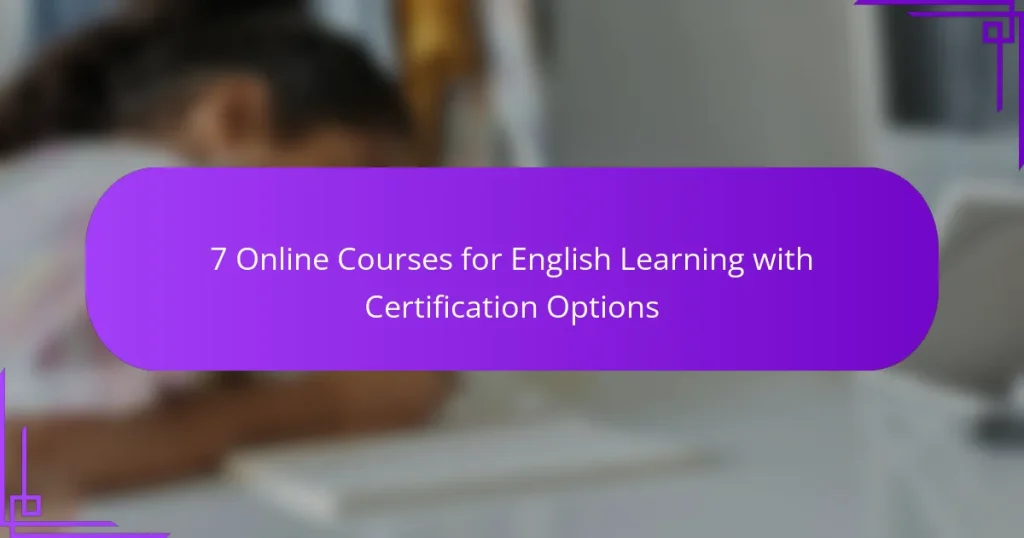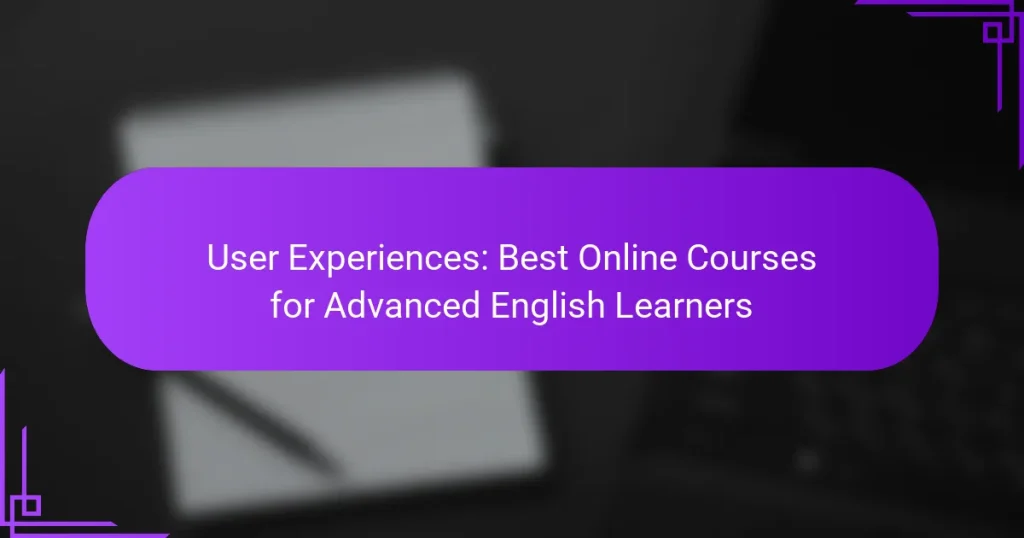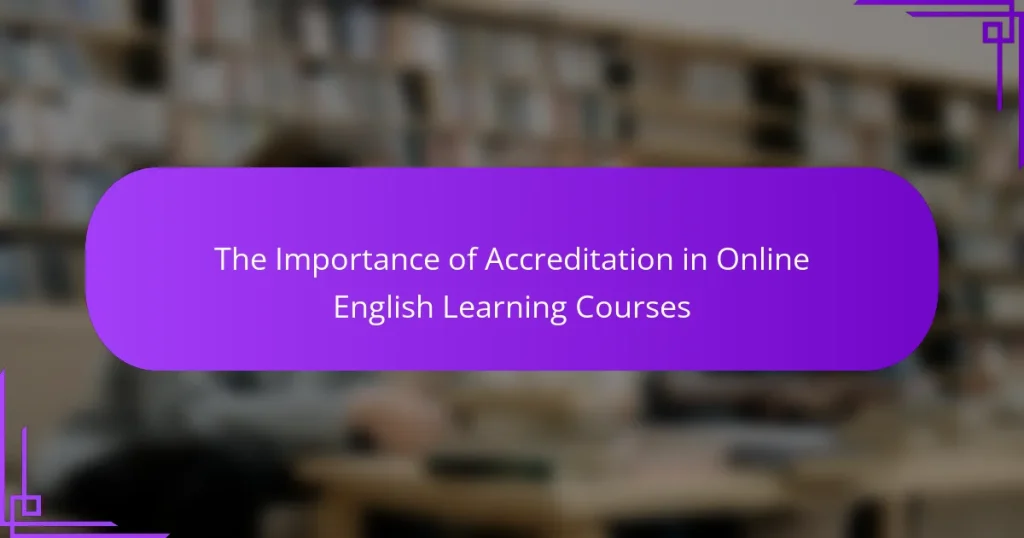Online courses and certifications in English provide a flexible and accessible way to enhance your language skills. With platforms like Coursera, edX, and Udemy, learners can choose from a variety of courses tailored to different levels and preferences. These programs not only improve language proficiency but also open up new career opportunities, making them a worthwhile investment for personal and professional growth.
7 Online Courses for English Learning with Certification Options
How to Balance Online Courses with Your Daily Schedule for English Learning
User Experiences: Best Online Courses for Advanced English Learners
The Importance of Accreditation in Online English Learning Courses
Comparing Online English Learning Courses: Content and Cost
How to Choose the Right Online Course for Learning English
What are the best online courses in English?
The best online courses in English offer a variety of options tailored to different skill levels and learning preferences. Platforms like Coursera, edX, Udemy, FutureLearn, and LinkedIn Learning provide comprehensive resources, including structured lessons and certifications that can enhance your language proficiency.
Coursera English Language Courses
Coursera features a wide range of English language courses from top universities and institutions. These courses often include video lectures, interactive quizzes, and peer-reviewed assignments. You can find courses focused on academic English, business communication, and conversational skills.
Many courses on Coursera are free to audit, but obtaining a certificate typically requires a fee, usually ranging from $30 to $100. Consider enrolling in courses that offer flexible deadlines to accommodate your schedule.
edX English Certification Programs
edX provides English certification programs from prestigious universities, focusing on various aspects of the language, including grammar, writing, and speaking. These programs often culminate in a verified certificate, which can enhance your resume.
Prices for edX certifications vary, generally between $50 and $300. Look for programs that offer financial aid options if cost is a concern. The self-paced nature of many courses allows you to learn at your own speed.
Udemy English Language Learning
Udemy offers a diverse selection of English language learning courses, catering to different levels from beginner to advanced. Courses are created by individual instructors, so quality can vary, but many include lifetime access to materials and updates.
Prices on Udemy can range from $10 to $200, often with significant discounts during sales. Check reviews and ratings before enrolling to ensure the course meets your needs.
FutureLearn English Courses
FutureLearn provides a variety of English courses that emphasize social interaction and collaborative learning. Many courses are designed in partnership with universities and focus on practical language skills for everyday use.
Most FutureLearn courses are free to access for a limited time, with the option to upgrade for a certificate. Consider joining courses that include discussions and peer feedback to enhance your learning experience.
LinkedIn Learning English Skills
LinkedIn Learning offers courses aimed at improving English skills for professional development. These courses cover topics such as business writing, presentation skills, and effective communication in the workplace.
A subscription to LinkedIn Learning typically costs around $30 per month, providing access to thousands of courses. Take advantage of the free trial to explore the platform and find courses that align with your career goals.
How to choose an online English course?
Choosing an online English course involves evaluating several key factors to ensure it meets your learning needs. Focus on accreditation, instructor qualifications, course content, and student feedback to make an informed decision.
Assess course accreditation
Accreditation indicates that a course meets certain educational standards. Look for programs accredited by recognized organizations or institutions, as this can enhance the credibility of the certification you receive.
In the United States, for example, courses accredited by the Council for Higher Education Accreditation (CHEA) are generally considered reputable. In Europe, check for accreditation from relevant educational authorities or associations.
Check instructor qualifications
The qualifications of instructors can significantly impact the quality of your learning experience. Verify their educational background, teaching experience, and any certifications they hold in English language instruction.
Instructors with advanced degrees in linguistics or TESOL (Teaching English to Speakers of Other Languages) often provide a more comprehensive understanding of the language. Look for profiles that highlight their teaching methodologies and student success stories.
Review course content and structure
Examine the curriculum to ensure it covers the areas you want to improve, such as grammar, vocabulary, or conversational skills. A well-structured course should include a mix of theoretical knowledge and practical exercises.
Consider courses that offer flexibility in learning pace and formats, such as video lectures, interactive quizzes, and live sessions. This variety can enhance engagement and retention of the material.
Consider student feedback and ratings
Student reviews and ratings provide insight into the effectiveness of a course. Look for testimonials that discuss the course’s strengths and weaknesses, as well as overall satisfaction levels.
Platforms like Course Report or Trustpilot can be helpful for gathering unbiased feedback. Aim for courses with a high percentage of positive reviews, ideally above 80%, to ensure a good learning experience.
What are the benefits of online English certifications?
Online English certifications offer numerous advantages, including improved career opportunities, enhanced language proficiency, and the flexibility to learn at your own pace. These benefits make them a valuable investment for both personal and professional development.
Improved job prospects
Obtaining an online English certification can significantly enhance your job prospects. Employers often seek candidates with proven language skills, especially in global industries where English is the primary mode of communication. A certification can set you apart from other applicants and demonstrate your commitment to professional growth.
Many companies prioritize candidates with certifications from recognized institutions. This can lead to better job offers, promotions, and salary increases. Consider focusing on certifications that are well-regarded in your industry to maximize their impact on your career.
Enhanced language skills
Online English certifications are designed to improve your language skills through structured learning. These courses often cover various aspects of the language, including grammar, vocabulary, and pronunciation, ensuring a comprehensive understanding. As you progress, you’ll gain confidence in your ability to communicate effectively.
Interactive elements such as quizzes, assignments, and speaking exercises can further reinforce your learning. Regular practice and feedback from instructors help solidify your skills, making you a more competent English speaker and writer.
Flexible learning schedule
One of the main advantages of online English certifications is the flexibility they offer. You can study at your own pace, fitting lessons into your busy schedule without the constraints of traditional classroom settings. This is particularly beneficial for working professionals or students with other commitments.
Many platforms allow you to access course materials anytime, anywhere, enabling you to learn when it suits you best. This flexibility can lead to a more enjoyable learning experience, as you can tailor your studies to match your lifestyle.
Access to global resources
Online English certifications provide access to a wealth of global resources that can enhance your learning experience. Many courses include materials from diverse sources, such as articles, videos, and interactive exercises, which expose you to various accents and dialects. This broad exposure can improve your listening and comprehension skills.
Additionally, online platforms often connect you with instructors and peers from around the world, fostering a rich learning environment. Engaging with a global community can provide valuable insights and cultural perspectives, further enriching your language education.
What are the costs of online English courses?
The costs of online English courses can vary widely based on the platform, course length, and level of certification. Generally, prices range from free introductory courses to several hundred dollars for comprehensive programs or certifications.
Average course fees on Coursera
On Coursera, English courses typically range from about $30 to $100 for individual courses. Specializations, which consist of multiple courses, can cost between $200 and $400. Some courses may offer financial aid or free trials, allowing learners to explore content before committing.
Pricing for edX English programs
edX offers a variety of English programs, with individual courses priced around $50 to $300. MicroMasters programs, which provide a more in-depth learning experience, can range from $600 to $1,500. Many edX courses allow learners to audit for free, providing access to course materials without a certificate.
Subscription models on LinkedIn Learning
LinkedIn Learning operates on a subscription model, charging approximately $30 per month or $300 annually. Subscribers gain access to a vast library of English courses, allowing them to learn at their own pace. This model is beneficial for those who plan to take multiple courses, as it can be more cost-effective than paying for each course individually.
What prerequisites are needed for online English courses?
To enroll in online English courses, learners typically need basic computer skills, internet access, and a willingness to engage with digital learning platforms. These prerequisites ensure that students can navigate course materials and participate effectively in online discussions.
Basic computer skills
Basic computer skills are essential for success in online English courses. Students should be comfortable using a computer or tablet, including navigating websites, sending emails, and using word processing software. Familiarity with video conferencing tools is also beneficial, as many courses incorporate live discussions.
Understanding how to troubleshoot common technical issues can save time and frustration. For instance, knowing how to clear a browser’s cache or update software can help maintain a smooth learning experience. If you’re unsure about your skills, consider taking a short introductory course on computer literacy.






